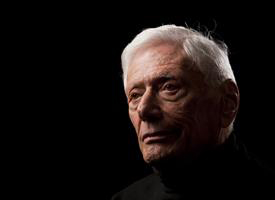
Bernard "Bernie" Weiss, Ph.D.
By Susanne Pallo
Bernard “Bernie” Weiss, ’53 (Ph.D.), professor emeritus of Environmental Medicine and Developmental & Behavioral Pediatrics, passed away on January 22 at the age of 92 as the result of a fall.
Weiss was a monumental and beloved figure in the scientific community, and helped found a field of research that tracks the impact of toxic chemicals on human behavior. His research sparked national discussions about the dangers of artificial food dyes, pesticides, and chemicals in plastics. He often advocated for better policies to protect the public.
As recently as 2015, Weiss participated in a national debate over the safety of food dyes, which the Food and Drug Administration had declared safe. Citing studies that showed an association between children ingesting food dyes and hyperactivity, Weiss supported a ban. Several large manufacturers, including Kraft, announced they would remove artificial food coloring such as Yellow No. 5 and Yellow No. 6 from its macaroni and cheese, replacing the dyes with natural ingredients such as turmeric and paprika.
”We are all gamblers. We scheme to conquer chance, to beguile it into surrender, to lull it into forgiveness. In the end, it subdues us; but without malice, and at times to our advantage. Like other lives, mine has been hostage to random collisions… Neurotoxicology will continue to be an adventure as long as its practitioners remain adventurers.”
Into the final years of his career, Weiss sat on advisory boards that review data and make recommendations about dioxin (an industrial waste product), metals, dental amalgams, the environmental conditions on NASA spacecraft, and air quality aboard commercial airplanes. Up to about two years ago, he could be found in lab several days a week, happy to offer consultation and support to other researchers. A scientific paper he co-authored is in the process of being published.
Deborah Cory-Slechta, Ph.D., professor and former chair of Environmental Medicine at URMC, trained as a postdoc in his lab. “Many of the issues Bernie began to address thirty or forty years ago are still major issues in the field today," she said. "He moved issues forward with creativity and foresight and his legacies will be with the field for a long time to come.”
Another colleague was fellow environmental health pioneer David Ozonoff, M.D., M.P.H., chair emeritus of environmental health at Boston University School of Public Health and co-editor-in-chief of the online journal, Environmental Health. He admired Weiss for his steadfastness, persistence to shared ideals, willingness to put his expertise at the service of the common good, his good humor, and not least, his major contributions to science.
“His legacy will not only be the scientific advances he made but those that will be made by others inspired and mentored by him,” Ozonoff said.
Weiss’ career began and ended at the University of Rochester. He earned a doctoral degree in Psychology at the University in 1953 and returned 12 years later as a faculty member.
In the intervening years, Weiss, a WWII Air Force veteran, conducted research at the Air Force School of Aviation Medicine in Texas, then Johns Hopkins University. He began developing ways to measure the impact of drugs, nutrients and chemicals on the brain, and built one of the first mini-computers ever used in research.
In 1965, Weiss was lured back to URMC as it launched one of the world’s first programs to grant a doctoral degree in toxicology. His research and mentorship helped build the program, which recently established the Bernard Weiss Endowment Fund in honor of his indelible mark on the program. The fund, which was organized by a group of URMC Toxicology Graduate Program alumni and staff, provides support for future leaders in the fields of neurotoxicology and toxicology.
Weiss received several honors. He was named Scientist of the Year by the Association of Children and Adults with Learning Disabilities in 1986. In 2003 he received a Distinguished Investigator Award from the Neurotoxicology Specialty Section of the Society of Toxicology. During the mid-1970s, Weiss took part in the U.S.-U.S.S.R. Environmental Health Exchange Agreement, where he led several U.S. delegations in discussions of behavioral toxicology with their counterparts across the globe.
When asked for an autobiographical statement for the journal Neurotoxicology forty years ago, Weiss wrote:
”We are all gamblers. We scheme to conquer chance, to beguile it into surrender, to lull it into forgiveness. In the end, it subdues us; but without malice, and at times to our advantage. Like other lives, mine has been hostage to random collisions… Neurotoxicology will continue to be an adventure as long as its practitioners remain adventurers.”
Weiss is survived by his children, Wendy (Les) Calkins and Tom (Debora) Weiss; grandchildren, Zachary (Sara), Nicole, William, Emily (Marcelo); brother, Leonard (Sandra); beloved partner, Marti Willit; nieces and nephews. A memorial service will be held at a later date.
To honor Weiss, consider making a contribution to the Bernard Weiss Endowment Fund.